Of
the former Soviet Republics in Central Asia, Tajikistan is the
smallest and poorest. It also served as the Russian invasion ground
for Afghanistan in 1979. A large number of Tajik men subsequently
died in the failed, drawn out war. The lingering effects of the
fighting combined with the problem of the country's ethnically
diverse population led to instability following independence in 1991.
Civil war erupted, and after two years, a new president elect named Emomali Rahmon ended the fighting. He later succeeded in maintaining peace and is now seen as a national hero. Ubiquitous
posters of the man emblazon the entrances of schools and other public
buildings. In them Rahmon has his hand raised high, while at the
bottom, boldly written words promise progress and growth.
During
my time in the region, Tajikistan was the third and final country I
visited. Kazakhstan and Kyrgyzstan which I'd traveled to first seemed
quite similar to one another in terms of the people and culture.
Tajikistan differed in that its history was shaped more by Persian
than Turkic influence. This became most evident in the languages
spoken. Tajik was mutually intelligible with Farsi, while Kazakh and
Kyrgyz had more in common with Turkish. The people in Tajikistan also
acted with greater Islamic conservatism. The
women covered their hair and a larger percentage of the men grew
beards. Moreover, I got the impression that they did not identify
much with Russian culture and the younger generation preferred to speak English over Russian. I could understand why. The legacy of the Soviet years was not a good one with the memory of the
Soviet-Afghan War still fresh on their minds. But I digress. Let's see how my time in the country went.
 |
| National Flag |
Border Crossing
Tajikistan lies south of Kyrgyzstan,
the country from which Calvin and I entered. There were two access
points. We chose the eastern one that crossed via the Pamir Highway.
The road led past a range of mountains including Peak Lenin, a 7135m
monstrosity split between the two countries. From there we needed to
deal with the immigration checkpoints. Oddly a tract of 20km
separated the Kyrgyz checkpoint from the Tajik one. Since we'd gotten
proper visas at an embassy beforehand the immigration officers let us
through without hassle and the other passengers in our taxi were locals.
From the border the unpaved Pamir Highway wound up a 4282m pass and
altitude sickness became a factor. It subsided as we came down the
opposite side, and an hour or so later we stopped at Kara-Kul, a deep
blue lake surrounded by high mountain peaks.
Kara-Kul village, on the eastern side
of the lake, was a place that seemed to exist at the edge of the
world. The village had one of the raunchiest public toilets I have ever
used. It was a little hut with three holes lined up on a cement
floor. The glaring problem was the lack of partitions. The toilet
also reeked of ammonia from the piss, a stench so strong my eyes
watered over. When I came out the stop provided time enough to size
up the small village. White mud structures fed down to the shore with
a single mosque sticking out from the bunch. The only sign that the
village was somewhat connected to the rest of civilization was the
line of electricity poles that ran in and out along the highway. The
Soviets had built the road in the 1930's for military purposes and it
had since become the lifeblood of the mountainous land. Large
commercial trucks now plied its entire length, many of which came
from Kashgar in western China. Otherwise vehicle traffic was scant
and limited largely to 4WD vehicles that could handle the dirt and
mud. Our taxi, a Toyota Landcruiser, took us as far as Murgab.
Murgab was essentially a larger
version of Kara-Kul village. There were more buildings, more people,
a small bazaar, and even two gas stations. But Murgab still had that
dusty, worn down look of an Old West town. The whole Pamir region was
as remote and desolate a place as I'd visited. It covered about half
the country of Tajikistan with less than 5% the population living
there. Murgab was one of its few real towns. After we arrived, Calvin
and I checked into its one hotel. The interesting thing was, we
didn't get a room. Instead we pitched our tent out front for two
dollars and could still use the hotel's amenities such as toilet and
shower. A surprising amount of other tourists had also made a stop in
Murgab. They were cyclists pedaling down the Pamir highway, simple
backpackers like myself, motorcyclists, groups on a rushed tour, and
perhaps most interesting, men participating in the Mongol Rally--a
charity event that had participants drive 10,000 miles from London,
across Asia, through Mongolia, and finally to Ulan Ude in Russia.
These participants had roughly a month and a half to do it and they
didn't linger long in town. The men crammed back inside their
vehicles and sped north leaving a swirl of dust behind.
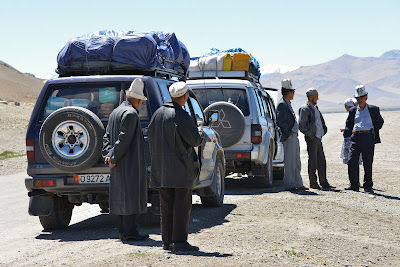 |
| Shared Taxi |
 |
| Mosque in Kara-Kul |
 |
| Near the Lake |
 |
| Passanger Gives a Kiss |
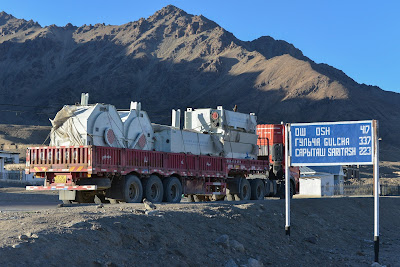 |
| Northbound Road Sign |
 |
| Murgab Mosque |
 |
| Kids Fooling Around |
Shared Taxi
In Murgab, Calvin and I had one simple
objective. We needed to find four other travelers so that we could
hire a shared taxi to take us to Khorog at the other end of the Pamir
Highway. Our search took an entire day and produced the following
members--Stefan, a German investments auditor, age 32; Ada and
Matilde, two French medical students, ages 24 and 25; and Aurelie, a
Belgian school teacher, age 32. Once assembled we formulated a plan.
We would travel a day down the Pamir and then take a side route to
Khorog along the Wakan Valley, a distance of some 480km. Next we
asked around for a vehicle and driver. The receptionist at the hotel
put us in contact with a local guy named Musa. That same night we met with
him and negotiated a price for the journey. Because we didn't want to
rush we decided on 5 days with several stop offs along the way, a
trip which came to $65 per person for the transport. This was the
only choice we had because no public buses ran on the Pamir Highway.
Then again, I suppose we might have tried hitchhiking, but that
would've meant we'd have to pass up a lot of sites on the way, and
the whole nature of it would've been unreliable, likely including
long waits in an area known for sparse vehicle traffic. So it was
settled. The next morning we gathered at 9:00AM in front of the
hotel, loaded up the 4WD Mitsubishi Pajero, and soon embarked.
Day one took us through mostly a wide
valley with peaks at every horizon. For lunch we stopped beside a
clear pond full of fish. At the adjacent restaurant they served us
the same type of fish, though the proprietor told us they were not
from the pond, but rather a nearby river. The fish were the small
bony type--deep fried and entirely edible. I still removed the bones.
After that we made for Yashil-Kul, an iceberg colored lake that was
not as cold as I'd imagined it might be. So I went for a swim.
Normally, I would have splashed around like crazy, but this time I
had to take it easy because the high altitude quickly had me short of
breath. None of the others joined me. Their loss. We would not have a chance to wash off again until the following night. Our guesthouse,
which we went to later, was as simple and barren as the surrounding
village of Bulunkul. Like elsewhere in the northern Pamir, the people
were ethnically Kyrgyz, and very Eurasian in appearance. Most
striking were the eyes. The guesthouse owner's daughters had ones with greenish, grey irises highlighted by black
edges. Not camera shy, the two gladly posed for pictures as I snapped
away like a Hollywood paparazzo. I wondered if past visitors
traveling the Pamir had done the same. If so, the girls were used to
the attention. Later that night I took out my Nikon again to shoot
the stars. The cold and moonless sky made for excellent photographic
conditions as I captured the Milky Way overhead. The others tried as
well, but their inferior cameras produced noisy, worthless images. In
the end I gave them copies of mine.
 |
| Clear Pond |
 |
| Fried Fish |
 |
| Kyrgyz Girls |
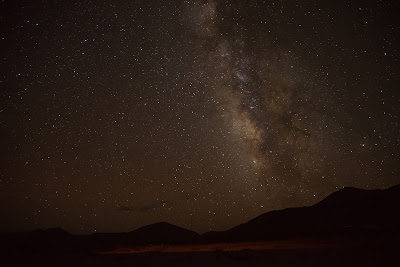 |
| Starry Night |
 |
| Musa Fixes the Pajero |
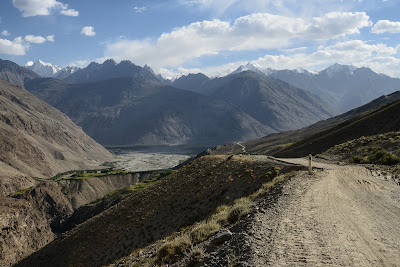 |
| Open Highway |
The second day of the journey led us
off the Pamir Highway and onto an even more rugged road along the Wakan
Valley between Tajikistan and Afghanistan. At the last checkpoint
before entering the area we took photos with the bored military men
manning the post. One of them let Matilde hold his AK-47 rifle. Then
we continued on through the remote and sparsely populated land, a river
marking the border beside us. The people in the valley were Tajik,
but spoke their own language, and moreover, followed the Ismaili
Islamic faith. Elsewhere in the country the people were predominately
Sunni. As a sign of their religious beliefs, the locals had a living room with a kind of sky light made of concentric squares and
five pillars holding up the ceiling. Of the five pillars one
represented the Prophet Muhammed, and another his first wife. As the
days passed we went from one guesthouse to the next. The
accommodation at these places included dinner, breakfast, and
sometimes, a hot shower. We also went to the ruins of Yamchun Fort,
a once mighty structure that had guarded an old Silk Road route into
China. A kilometer from the fort was a hot spring called Bibi Fatima.
The facility had a large building with separate indoor pools for men
and women. On our side, Calvin, Stefan, Musa and I enjoyed a dip in
the hot water. A Japanese tourist later popped his head in and
started taking photos while we were sitting naked. He then left, just
as fast as he'd entered. On the other side Ada, Aurelie and Matilde
shared their pool with a dozen Tajik women of various ages. They
later told me the local women had shaved their pubic hair. That was some
real food for thought.
The road continued along the
Afghanistan border and the further west we went, the more villages we
saw on both sides of the border. The Tajik side, however, was far
more developed. Towards the end there were towns with multi-storied
buildings, paved roads and traffic signals. Otherwise the people
lived in scattered houses surrounded by greenish-yellow barely
fields. Finally, on the fifth day we arrived in Khorog. It was the
first proper city I saw in Tajikistan, and as was the case with the
other Tajik cities I'd later visit, I took an immediate liking to the
place. Not that Khorog had anything interesting to see or do. The
city's charm came instead from its pleasant atmosphere and vibrant
people. That and there were many restaurants that offered a wide
variety of dishes on the menu. Since I'd entered the country, food
had been so limited, and now I had access to real stuff like pizza and ice cream. Moreover, I could use the Internet for the
first time in a week. Khorog, in short, was the perfect place to
recharge and prepare for the journey ahead.
 |
| Matilde and AK-47 |
 |
| Out to Dry |
 |
| Tajik Instruments |
 |
| Yamchun Fort |
 |
| Graffiti |
 |
| Old Ladies |
 |
| Meal at Guesthouse |
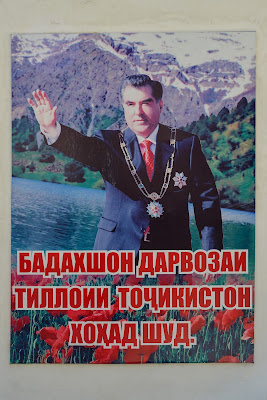 |
| Rahmon Poster |
 |
| Khorog Bazaar |
Travel Beard
I remember learning about Sigmund Freud
in Psychology 101 at university. Now, over ten years later, the only
knowledge that remains is his theory of penis envy. How could I
forget such a thing? Freud postulated that women envied a man's
penis, and boys likewise envied the size of their father's penis.
This somehow influenced people's behavior. I suppose I too had a bit
of the penis envy complex growing up, especially after I started
watching pornography. But as time passed I started to care less that
I didn't have a huge package, and worried more about other physical
shortcomings. Most troubling was the size of my hands. The palms are
fine, but the fingers are short and slender. This means I never had
any hope at becoming a pianist (not that I ever harbored such
aspirations). The real problem I experienced was in sports. I
couldn't palm a basketball in high school gym class, and while
wrestling I had a harder time grasping an opponents wrist.
I'm sure everyone has something they
would physically change about themselves. Apart from my hands, maybe
I could be a little taller. And I'd change my facial hair too. I can
grow a mustache and a bushy goatee, but having a proper beard is
another matter. When I go unshaved for a long while little patches of
uneven hair still remain on the sides, and they detract from the
symmetry and overall gravitas that a good beard should represent. So
those parts I shaved. This was how it's always been and I was fine
with it, at least until I started traveling. I met a lot of other
tourists after leaving Japan, some of whom had big scruffy beards.
This was because they'd chosen to forgo shaving as one month on the
road led to another. When I saw these beards a pang of envy jittered
in my gut. I too wanted a travel beard, and after 8 months of
encountering them at every backpacker hostel I visited, I'd had
enough. It came time to grow one of my own. I no longer cared how
terrible it looked.
In total I needed about 60 days before
the beard grew thick enough to cover the gaps. I was half way through
Tajikistan at the time, and as I walked the high mountains, my beard
quivered in the cool, invigorating wind. Never before had I
maintained my facial hair for so long. In a primal way, I felt as if
I'd finally become a complete man--the total package. The genuine
article. Moreover, my beard was now more than simply an extension of
my person. It'd taken on a life of its own. And I had no intention of
shaving it. The beard will grow with me while I continue my world
travels. The thought excites me. I want to know how long it can
become, and if it'll give me the same air of manliness as say, Freud,
Abe Lincoln or Chuck Norris. I look forward to finding out.
 |
| Hairy Face |
Hitchhiking
Slowly but surely, my impression of
Tajikistan became that of a country defined by one long road. At
least in the eastern part. Two main roads were the only means to get
to the capital of Dushanbe. After Khorog I opted to take the southern
route. At first I was with Calvin, Matilde, Ada and Aurelie. Stefan
had rushed ahead by shared taxi, leaving us behind. Then it was only
two of us because the others wanted to do a hike in the Jizeu valley.
I didn't feel up to it and instead headed to the capital with
Aurelie. To save money we gave hitchhiking a go. We didn't have much
luck at first. Perhaps we covered 70km after a day. This was not
good. 650km still stood between us and Dushanbe. On the bright side
we met a local woman who invited us to stay at her family's home. She
cooked for us as well, serving up a soupy platter consisting of
tomatoes and potato. The woman, Tajimisso, said she liked English,
and hoped to one day study in London. A cousin of hers already lived
there. It seemed many Tajiks relocated abroad, though most went to
Russia where they could easily get a work visa.
On the second day, we awoke early and
had tea and bread for breakfast. Afterwards, Tajimisso helped us flag
down a truck. The driver was en route to Dushanbe. He said Aurelie
and I could join him, so we climbed into his 12-wheeler. The Shacman
truck, I quickly realized, did not have good suspension for the
unpaved road, and as a result, it was slow going the entire way.
After a while I felt as if seated on an old, rickety carnival ride.
As for Aurelie, she'd become sick while on the Pamir Highway, and the
motion of the truck didn't do her upset stomach any good. More than
once she asked the driver to stop so that she could do her business
on the side of the road. On another occasion we had to pull over
because of a flat. The driver got out to remove the tire from the
truck and replace its inner tube, a laborious task that took over an
hour. Then, later in the evening we had a second flat. Because it
was a bolt that had punctured the tire, the driver needed to patch
the hole before putting everything back into place. It had become
dark by then and I helped by holding a flashlight. While watching, I
thought the task didn't look too different from the repair job on a
bicycle tire, except for it being on a larger scale. In any event,
the flats really slowed us down. By the time we stopped for the night
we were no where close to Dushanbe.
 |
| Road to Dushanbe |
 |
| Tajissimo and Aurelie |
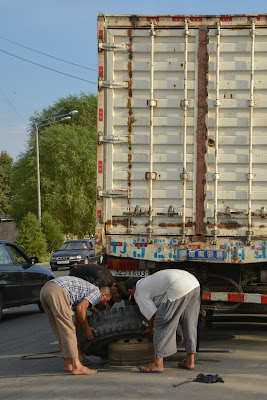 |
| Flat Tire |
 |
| At the Wheel Again |
 |
| Another Truck |
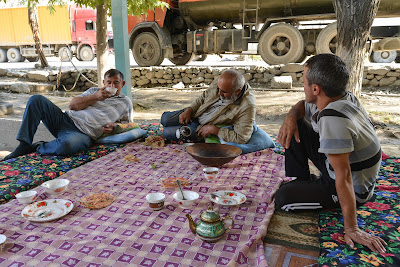 |
| Lunch Time |
On the third day our luck did not
improve. Two other flat tires brought us to a halt. The driver
couldn't believe it for the last one. He beat the steering wheel,
cursed aloud and shook his head. I felt really bad for him. At the same time I wondered how we could get so many flats. It was then the
driver said he was carrying a heavy load of statues from China which explained why the tires kept giving out. And our mechanical
difficulties weren't the only thing keeping us from Dushanbe. We had
to make additional stops at road checkpoints and came to about ten of
them Each time the armed guards wanted to see our passports. The
driver also handed over a 5 somoni bill (about a dollar) before
passing through. Because he slipped it into their palm I'm pretty
sure it was some kind of bribe. Then there were the stops for food.
Aurelie who wasn't feeling good could hardly eat a thing. In the
meantime I was trying to look after her, giving her medicine and what
not. For a while the driver thought we were married. He then told us
with a smile how he had two wives. Apparently, it was acceptable in
Tajikistan to have up to four. I joked with Aurelie that if I had
that many wives I'd probably kill myself. Hell, the stress from one
relationship might be cause enough. Aurelie didn't find my comments
funny. If anything, she pitied the women who became someone's second
wife. I shrugged and drank my tea. Such was the Muslim world.
We arrived in Dushanbe late. Very late.
It was past 2:30AM, and since the driver was not headed to the city
center, he dropped us off where there were still taxis. It was an
area with bars and nightclubs. A taxi driver approached us, asking
for a lot of money to take us to a hotel. We had no idea of the
distance and didn't see the point of paying for a room, not if for
only a few hours. The alternative was to make use of my tent in a
nearby park. Still close to the road, we heard drunk men coming out
of the nightclubs. A few got into an argument which frightened
Aurelie. I assured her everything would be alright. And it was. After
a bit of sleep, we rolled up the tent, took a microbus to the center
and found a hotel. Next, I used the Internet to contact Calvin. It
turned out that following his hike in Jizeu he had taken a shared
taxi and reached Dushanbe a day ahead of us. He was still with the
French girls. They were about to leave for the north but Calvin
stayed another day because of me. That night, over dinner, we made
plans for the next part of our trip. We were determined to do a
three-day hike in the lakes region of the Zerafshan Valley. Aurelie
who didn't like strenuous activities decided to pass. So once again
it was only Calvin and me, the open road ahead of us.
 |
| In the Capital |
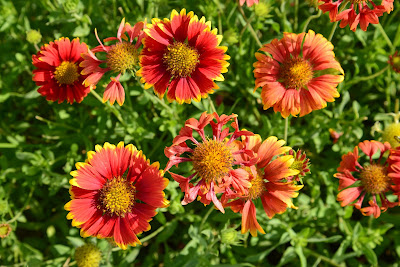 |
| Flowery Park |
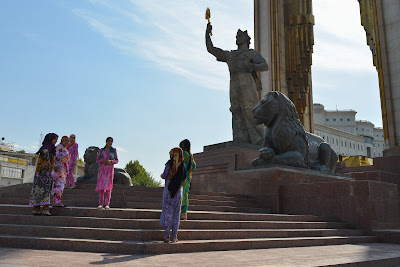 |
| King Somoli Statue |
 |
| Main Street |
 |
| Palace of Nations |
Afghanistan
In the south of Tajikistan it was possible to cross into Afghanistan, and for most Westerners getting a visa wasn't
difficult. Permits came at extra cost and they weren't available for many parts of the country. It goes without saying that in Afghanistan safety was an issue. For example, when we were in Tajikistan we heard that the Taliban had become active again opposite the border. While
in Murgab we even saw someone who looked like a Taliban soldier. The
dark faced, bearded man had on a checkered red and white turban, a
loose vest, faded khakis and military boots. He came to our hotel
restaurant late at night and sat in a corner with another shady
figure, a Russian type dressed in military fatigues. The two spoke at
length in hushed voices, and if any glance veered in their direction,
they met it with angry eyes. Perhaps the men were talking about
sports or women. Or they might've been discussing a drug deal.
Afghanistan is the world's largest opium producer and truck loads of heroin
move outside the country via the Pamir Highway. Or it could be the
men were up to something more sinister, maybe an assassination or
terrorist plot. Whatever it was, I didn't stay around long enough to
find out. That next morning I left in the shared taxi with Calvin and
the others.
A
ways south from Murgab the Afghan-Tajik border ran east-west for 1,300km. I covered around half that distance. The journey started in the
shared taxi and continued later while I hitchhiked. Because the roads
we took paralleled the river between the two countries, I was never
more than 200m away. For seven days, to my left all I saw was
Afghanistan. I could best describe the terrain as an endless line of
mountains with villages in the places that arable land allowed
for farming. In some areas the people had no vehicle access. The only
way in or out was on narrow footpaths. Apart from being less
developed it didn't look any different from the Tajik side. The
people were the same too, and as I'd later learn, more ethnic Tajiks
lived on that side of the border than in Tajikistan. But they weren't
the dominant group in Afghanistan. That title belonged to the
Pashtuns. A tribal people notoriously protective of their land, the
Pashtuns had never submitted to a foreign power. They were also
renowned for their hospitality and openness. A shame I didn't have
the chance too meet any. The closest I came was an encounter with an
Afghan man who ran a guesthouse in the Wakan Valley. Because his
father had immigrated from Afghanistan, the son still retained some
Afghan traditions. His wife also made one of the better home cooked
meals I ate in Tajikistan. It was a kind of potato porridge with
carrot and tomato. All the ingredients were fresh too, having come
from the guesthouse garden.
As
we continued onward, ever present Afghanistan became an obsession for
me. I kept thinking at some point I might be able to set foot in the
country. I simply needed to cross the river standing in the way.
Eventually an opportunity presented itself. It began when Ada and
Matilde wanted to take a dip in the River Pyanj. Our driver, Musa,
obliged. He stopped the Pajero at a spot where the water appeared
calm. After we went in, I noticed the river was also quite shallow.
Without much hesitation I made my way towards the Afghan shore.
Unfortunately, 20m from the other side, the river deepened and rose
past my waist. Meanwhile a strong current pulled at my legs. I now
had a decision to make. Across the river only rocks and little shrubs
awaited me, yet I so badly wanted to keep going. However, if I
advanced further the water might drag me under. In retrospect the
right choice seems obvious. I should've turned back round and
returned to the Tajik shore. And that's what I did. But I needed
several minutes before I could give up on my dream of reaching
Afghanistan. When I dried off and hopped back into the taxi, we left
the spot. As I'd feared, I never got another chance to cross over. I
guess some things aren't meant to be.
 |
| Stefan Poses Across from Border |
 |
| Afghanistan on Left, Tajikistan on Right |
 |
| Guesthouse Family |
 |
| Only a River Away |
Central
Asian Cuisine
One
of the greater joys of travel is trying new foods, and among the
places I've visited, Thailand, Malaysia, Korea and China have had
exceptional cuisine. Other countries such as Myanmar, Bangladesh and
Cambodia left much to be desired. There were also those countries
with average food. India comes to mind. Some dishes were outright
amazing, but half the time I feared I'd get sick. The sanitation was
that poor. As for the central asian countries, they too fit more or
less into the middle of the culinary scale. Almost everything had
tomato, potato and onion. But a few dishes did stand out. The best
was boso lagman. Consisting of fried noodles and vegetables,
the dish came originally from the Uyghur region of western China. It
was a favorite of Calvin's as well. And most foreigners I met expressed a liking for manti too, something similar to boiled
Chinese dumplings, only larger.
Over time I came to like the standard Central Asian dishes borcht
and pilaf as well , though I can't say they were anything to rave about. Borcht was
a soup made of beetroot and potato, and pilaf contained seasoned rice, diced vegetables and
meat. I should add that the restaurants in bigger cities offered
Western food too. For example, fast food type places had hamburgers
and hotdogs. In Kyrgyzstan the meat inside the burgers was cut from a rotisserie spit, and oddly, the food didn't come with fries. Tajik restaurants had burgers with patties and fries, yet In spite of this, I didn't enjoy them. One in particular tasted so awful I managed only two bites. The meat smelled farty, the cheese was hard, and the bun stale. And I don't
even know what the hell type of sauce they put in it. The pizzas I
tried in Tajikistan didn't taste great either. But draw any conclusions based on only a few meals. Besides, not all the food was bad.
The shawarmas (kebab meat wrap) in Dushanbe were the best I had
in Central Asia. And the local fruit was delicious. The grapes and
strawberries at one bazaar went for only about $0.35 a kilogram. I
also bought apples, apricots, watermelon, cantaloupe, pears, peaches and
nectarines. What I didn't get were bananas. Imported from abroad,
they cost a fortune, selling at places for almost a dollar a piece.
Another
interesting thing to eat was a Tajik dish called kurutob. The
food came in a large clay bowl intended for more than one person. The
contents were diced vegetables, a sour yogurt sauce, and chunks of
bread. I found it delightful both times I tried it. But the taste
aside, the dish was a bit unusual because the bread was mixed in with
the food. With every other meal it came served separate. The most
popular variety of bread in the region was a big circular type with elevated
edges, kind of like a fat pizza crust. This bread often had a design
of small interlocking circles on the surface made by poking
small holes into the dough before baking it. At guesthouses, jam and
butter came included. Tea too was brought out for every meal. The two
main types were green and black. In Tajikistan local custom dictated
that the first cup go back into the pot. As for sugar, people added
heaps wherever I went. In some homes the sugar looked like orange
quartz. The people broke off pieces and let it dissolve in their
cups. I never used any. I prefer my tea straight, same as my coffee.
 |
| Boso Lagman |
 |
| Pelimen Soup |
 |
| Chicken Kebab |
 |
| Cafeteria Style Food |
 |
| Kurutob |
Lakes
Region
North
of Dushanbe, towards Tajikistan's other large city of Khojand, lied
the large Zerafshan Valley. It ran into neighboring Uzbekistan and
was home to mountain lakes and peaks of over 5000m. Calvin and I went
to the eastern entry point, a town called Sarvoda. By now the end of
August had arrived. The hiking season too was over and the weather
had become unpredictable. Rain could come at any time. Still
determined to do our hike, Calvin and I hired a taxi to take us high
into the mountains. A light drizzle and clouds shrouded the area in
grey. After a bit of hiking we first arrived at the Alaudin Lakes.
They were perhaps the clearest lakes I'd seen in my life. And more
astounding were their colors. In the shallows algae formed a web of
green while the centers had the deep blue of topaz. However, the poor
weather prevented us from seeing the lakes at their best. We made
camp on the shore and hoped by morning the sky would clear.
The hour
was still early. To pass the time we watched videos inside the tent
on Calvin's Samsung tablet. He'd gotten me into Avatar: The Last
Airbender, an animated series that takes place in a medieval
fantasy world where people can control the elements. Years before I'd
been a big fan of Japanese animation, and Avatar, though an
American show, emulated the style very well. The series felt like an
anime not only in style, but also tone and humor. Because Calvin and
I had already spent many nights in the tent, we'd also watched other
shows and films. It was quite odd. We'd done camping all over, often
miles from any town, and instead of enjoying the silence of nature or
engaging in thoughtful conversation, we preferred to zone out with
our digital devices once inside the tent.
For
the second day of our hike, we awoke to rain and discovered that a herd of cows had invaded our spot along the water. The animals had no shame.
They tore up grass and shat where they stood. We packed up the tent
and made for Alaudin Pass. The rain subsided on the way up, but by
then I was too far from the lake to take nice pictures. The larger
mountains also remained covered by clouds. So in spite of being in an
incredibly picturesque setting I failed to get any good photos. Later
we reached the 3860m pass and continued on the trail past Mt.
Chimtarga and its glacier, both still hidden by clouds. The hike went
okay for a while until heavy wind and rain set in. We'd planned to
set up camp at another lake called Kulikalon which was still hours
away. I didn't own waterproof gear like Calvin and had to endure the
cold and wetness in only a wool sweater. Eventually we came to the
lake's shore. The spot we chose for the tent was on a small rise
surrounded by rocks, bushes and other natural scenery, but again, the
weather ruined the atmosphere. Our tent wasn't entirely waterproof
either. Rain leaked in from the sides and persisted well after dark.
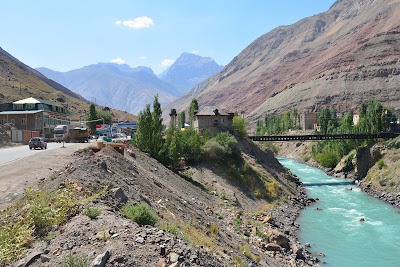 |
| Sarvoda Town |
 |
| One Alaudin Lake |
 |
| Green Algae |
 |
| From a Distance |
 |
| Sheep Grazing |
The
next morning the weather was still poor. We needed to hike out of the
mountains to a village where we could find a guesthouse. Along the way
we ran into a group of Tajik students on a trip to Kulikalon Lake.
They asked to take group pictures and we posed for a few. Then on we
walked until the trail linked up with a dirt road. A few simple homes
now lined the river valley we passed through. At one, a woman waved
us over. She gave us bread and fruit while her children looked on
with curious eyes. The kids also each drank from my water bottle.
Seeing them put their tongues in the opening made me not want to have
anymore, this in spite of being very thirsty later. When the family dog came the kids mounted and choked it. I'd have have snapped them in the faces. Before departing
we offered the woman some money for the food. She didn't seem to want
it, but the children stepped forward and gladly took the cash.
Back
at the road a guy stopped his car and said his family had a guesthouse in the
village of Artush. He quoted a reasonable price and offered to give
us a lift the rest of the way. Storm clouds were again brewing on the
horizon, so we agreed, and off we went in his small, beat up vehicle.
The patter of rain soon sounded as the man drove us past farms
and donkeys en route to the house. It turned out to belong to his
sister. We arrived early in the day and she served us lunch on top of
the usual dinner included in a stay. At the table her son took an
immediate interest in us. He kept coming into our room and later
wanted to play checkers. I gave it a go. The rules were different
than the American version and I figured them out too late to beat him. Calvin avenged me. The boy requested a rematch
and won the second time. He didn't realize Calvin had lost on
purpose.
Our
last stop in Tajikistan was Khojand, the country's second largest
city. We stayed one night in order to see the bazaar and mosque complex, then crossed into Kyrgyzstan. There ended our
adventures in Tajikistan. In total we spent three weeks in the
country, having made a loop south from the Kyrgyz city of Osh and
then back. As for my final impressions of Tajikistan, I'd say it
wasn't so easy a place to travel without spending a lot of money.
Accommodation was pricey as was transport outside the main cities.
I'd found this odd considering the low standard of living. But I
should have expected it. Tourism was relatively new to the country
and rural areas lacked infrastructure. So to go to remote places and
get things done cost a fair amount. However, it was in the difficult to reach areas that the people showed the most kindness. Several times they invited me to stay at their home. Too bad the short notice made it difficult for me to change my plans. More often than not I had to decline.
 |
| Khojand Baazar |
























































GENUINE LOAN WITH LOW INTEREST RATE APPLY
ReplyDeleteDo you need finance to start up your own business or expand your business, Do you need funds to pay off your debt? We give out loan to interested individuals and company's who are seeking loan with good faith. Are you seriously in need of an urgent loan contact us.Email: (urgentloan22@gmail.com)
BORROWERS DATA FORM
1)YOUR NAME:_______________
2)YOUR COUNTRY:____________
3)YOUR OCCUPATION:_________
4)YOUR MARITAL STATUS:_____
5)PHONE NUMBER:____________
6)MONTHLY INCOME:__________
7)ADDRESS:_________________
8)PURPOSE:_________________
9)LOAN REQUEST:____________
10)LOAN DURATION:__________
11)CITY/ZIP CODE:__________
12)HAVE YOU APPLIED FOR LOAN BEFORE?
E-mail: (urgentloan22@gmail.com)
Hello Everybody,
DeleteMy name is Ahmad Asnul Brunei, I contacted Mr Osman Loan Firm for a business loan amount of $250,000, Then i was told about the step of approving my requested loan amount, after taking the risk again because i was so much desperate of setting up a business to my greatest surprise, the loan amount was credited to my bank account within 24 banking hours without any stress of getting my loan. I was surprise because i was first fall a victim of scam! If you are interested of securing any loan amount & you are located in any country, I'll advise you can contact Mr Osman Loan Firm via email osmanloanserves@gmail.com
LOAN APPLICATION INFORMATION FORM
First name......
Middle name.....
2) Gender:.........
3) Loan Amount Needed:.........
4) Loan Duration:.........
5) Country:.........
6) Home Address:.........
7) Mobile Number:.........
8) Email address..........
9) Monthly Income:.....................
10) Occupation:...........................
11)Which site did you here about us.....................
Thanks and Best Regards.
Derek Email osmanloanserves@gmail.com
Hello Everybody,
My name is Ahmad Asnul Brunei, I contacted Mr Osman Loan Firm for a business loan amount of $250,000, Then i was told about the step of approving my requested loan amount, after taking the risk again because i was so much desperate of setting up a business to my greatest surprise, the loan amount was credited to my bank account within 24 banking hours without any stress of getting my loan. I was surprise because i was first fall a victim of scam! If you are interested of securing any loan amount & you are located in any country, I'll advise you can contact Mr Osman Loan Firm via email osmanloanserves@gmail.com
LOAN APPLICATION INFORMATION FORM
First name......
Middle name.....
2) Gender:.........
3) Loan Amount Needed:.........
4) Loan Duration:.........
5) Country:.........
6) Home Address:.........
7) Mobile Number:.........
8) Email address..........
9) Monthly Income:.....................
10) Occupation:...........................
11)Which site did you here about us.....................
Thanks and Best Regards.
Derek Email osmanloanserves@gmail.com
Hello Everybody,
ReplyDeleteMy name is Mrs Sharon Sim. I live in Singapore and i am a happy woman today? and i told my self that any lender that rescue my family from our poor situation, i will refer any person that is looking for loan to him, he gave me happiness to me and my family, i was in need of a loan of S$250,000.00 to start my life all over as i am a single mother with 3 kids I met this honest and GOD fearing man loan lender that help me with a loan of S$250,000.00 SG. Dollar, he is a GOD fearing man, if you are in need of loan and you will pay back the loan please contact him tell him that is Mrs Sharon, that refer you to him. contact Dr Purva Pius,via email:(urgentloan22@gmail.com) Thank you.
How I Got My Loan From A Genuine And Reliable Loan Company
ReplyDeleteMy name is Mr Frank. I live in Oman and i am a happy MAN today? and i told my self that any lender that rescue my family from our poor situation, i will refer any person that is looking for loan to him, he gave me happiness to me and my family, i was in need of a loan of $150,000,00 and was scammed by those fraudulent lenders and a friend introduce me to MR IBRAHIM MUSA,and he lend me the loan without any stress,you can contact him at (creationfinance7@gmail.com)
1. Your Full names:_______
2. Contact address:_______
3. Country Of Residence:______
4. Loan Amount Required:________
5. Duration:_____
6. Gender:_____
7. Occupation:________
8. Monthly Income:_______
9. Date Of Birth:________
10.Telephone Number:__________
Regards.
Contact Him At :creationfinance7@gmail.com
WhatsApp Number +919717357946
We are Offering best Global Financial Service rendered to the general public with maximum satisfaction,maximum risk free. Do not miss this opportunity. Join the most trusted financial institution and secure a legitimate financial empowerment to add meaning to your life/business.
ReplyDeleteContact Dr. James Eric Firm via
Email: financialserviceoffer876@gmail.com
Whatsapp +918929509036
Best Regards,
Dr. James Eric.
Executive Investment
Consultant./Mediator/Facilitator